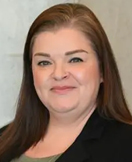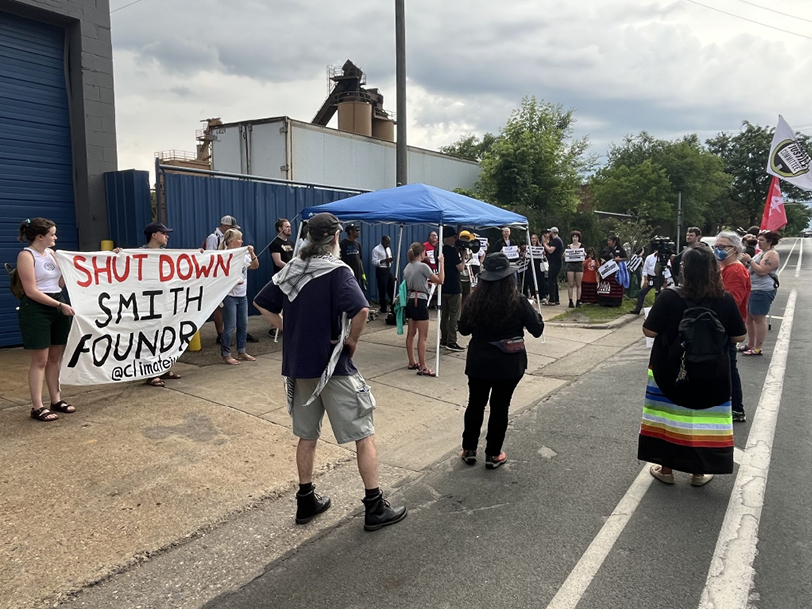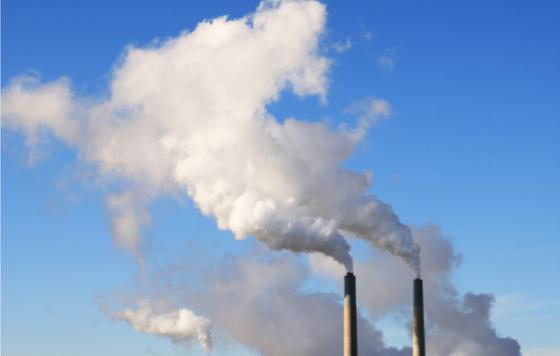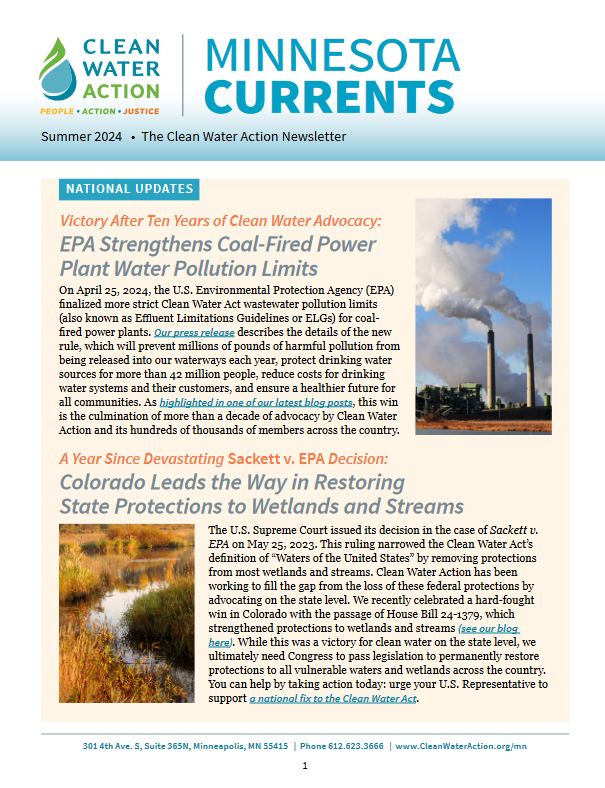In This Issue:
- National Update
- Tackling PFAS: Where Do We Start?
- Amara’s Law Implementation
- East Phillips Advances Environmental Justice
- Implementing the Cumulative Impacts Law
- Election Updates
- Meet Morgan Schafer - New Zero Waste Organizer in Minnesota
National Update
Victory After Ten Years of Clean Water Advocacy: EPA Strengthens Coal-Fired Power Plant Water Pollution Limits
On April 25, 2024, the U.S. Environmental Protection Agency (EPA) finalized more strict Clean Water Act wastewater pollution limits (also known as Effluent Limitations Guidelines or ELGs) for coal-fired power plants. Our press release describes the details of the new rule, which will prevent millions of pounds of harmful pollution from being released into our waterways each year, protect drinking water sources for more than 42 million people, reduce costs for drinking water systems and their customers, and ensure a healthier future for all communities. As highlighted in one of our latest blog posts, this win is the culmination of more than a decade of advocacy by Clean Water Action and its hundreds of thousands of members across the country.
A Year Since Devastating Sackett v. EPA Decision: Colorado Leads the Way in Restoring State Protections to Wetlands and Streams
The U.S. Supreme Court issued its decision in the case of Sackett v. EPA on May 25, 2023. This ruling narrowed the Clean Water Act’s definition of “Waters of the United States” by removing protections from most wetlands and streams. Clean Water Action has been working to fill the gap from the loss of these federal protections by advocating on the state level. We recently celebrated a hard-fought win in Colorado with the passage of House Bill 24-1379, which strengthened protections to wetlands and streams (see our blog here). While this was a victory for clean water on the state level, we ultimately need Congress to pass legislation to permanently restore protections to all vulnerable waters and wetlands across the country. You can help by taking action today: urge your U.S. Representative to support a national fix to the Clean Water Act.
Tackling PFAS: Where Do We Start?

In June, I spent four days in Michigan for the National PFAS Conference with Clean Water Action President and CEO Jeff Carter. The conference featured impacted community members, scientists on the cutting edge of research, members of Congress, White House officials, and a keynote from the United Nations. Topics ranged from discoveries in PFAS health effects, human and worker rights related to PFAS, guidance for clinicians, and so much more. It was intense and the coffee cups were too small for the gravity of the topic.
I was inspired by the White House and the United Nation’s commitment to addressing this issue. It is a daunting topic. It’s easy to feel hopeless and frustrated. PFAS is everywhere, where do we start? It’s in our water, our food, our air, and our soil. We can tell the truth louder than the chemical industry can share misleading information. We have proof connecting PFAS exposure to negative health impacts. We know the way PFAS spreads and crosses between water, soil, and air and we can slow this spread. We know this problem will be expensive and difficult to fix, but we know turning off the tap is a powerful first step. We start with the truth. It’s just that simple. — Avonna Starck, Clean Water Minnesota Director
Amara’s Law Implementation
We are less than 200 days away from the implementation of Amara’s Law, the most comprehensive ban on PFAS chemicals in the world. We are working closely with the Minnesota Pollution Control Agency to help Minnesotans understand who Amara’s Law implementation will impact them. Starting January 1st 2025, 11 consumer product categories cannot contain PFAS. Carpets/rugs, cleaning products, cookware, dental floss, fabric treatments, juvenile products, menstruation products, textile furnishings, ski wax, and upholstered furniture will be a lot less toxic! The July 18th, 2024 webinar information can be found here.
East Phillips Advances Environmental Justice

East Phillips community members show up on a rainy day to celebrate the EPA settlement with Smith Foundry that will limit pollution in their community.
The East Phillips community in South Minneapolis recently had a big environmental justice win! Last year, an EPA investigation exposed that Smith Foundry, a local iron foundry, had been in violation of their permit for a number of years. This spurred community protest and calls for the facility to be shut down. Recently, the EPA announced a settlement with the facility that will severely limit the pollution from the facility over the next year and beyond. This comes after a polluting asphalt plant right next to Smith Foundry announced that they would be shutting down their facility due to stricter environmental regulations. Learn more.
Implementing the Cumulative Impacts Law
Last year, Minnesota became the third state to pass a comprehensive cumulative impacts law. This law will give substantial regulatory protections to overburdened, historically marginalized communities in the Twin Cities metro area, Rochester, and Duluth. This work took years of build up to become a reality, but the job is not done just because the bill was signed into law.
Due to the complexity of the issue, large parts of the law were left up to the rulemaking process. The Minnesota Pollution Control Agency (MPCA), the state agency overseeing this law, is now going through the rulemaking process to clarify exactly how this law will be implemented. This could make or break the cumulative impacts law. Thankfully, part of the law states that the MPCA “must engage in robust public engagement, including public meetings, and tribal consultation”. This will help ensure that impacted communities have a real say over what these rules look like.
This spring, the MPCA hosted a series of online co-learning sessions. The agency brought in various experts from Washington State, Colorado, New Jersey, Detroit, and elsewhere to share their insights on different aspects of cumulative impacts. These sessions came at the urging of advocates, arguing that many community members don’t know enough about the basics of cumulative impacts or the more technical aspects of rulemaking to properly inform how these rules are written.
The MPCA is now shifting towards in person brainstorming sessions to start fleshing out what different parts of the rule could look like. Among the aspects of the rulemaking that are required, the most important are determining when a facility is mandated to conduct a cumulative impacts analysis, defining substantial adverse impact, and creating a process for community members to either agree to or reject a community benefit agreement. If industry gets their way, we will end up with rules that rarely force polluters to analyze their impacts, and keep community members out of the decision making process entirely.
This law was passed with the explicit goal of protecting and empowering historically marginalized communities. We know that environmental racism is real and ongoing. We see the impacts it has on health, wellbeing, and quality of life in our communities. In order for the cumulative impacts law to work, the rules must ensure that polluting facilities are properly vetted, and provide impacted communities with the final say when a facility is having too much of an impact.
Our role at Clean Water Action is to help educate and connect the community members with decision makers, to uplift their voices and stories and collectively advocate for strong regulations. We are in the middle of fundamentally shifting how air quality regulations work in Minnesota, and we’re only just getting started.
Election Update
What a time to be alive — once again, we have the “most important election of our lives” on the horizon. I’m not going to sit here and say we have perfect candidates in any level of our ballots, but I will say that it behooves us to use each election as an opportunity to elect pro-environment candidates. If you’re planning on using our endorsements as a way to inform your decision, fret not, that list is coming and will be published on our website (we’ll also be using our social media to promote that endorsement list, so be sure to follow us on the litany of social media sites).
“All politics is local” is a favorite phrase of mine, even if the original source is a point of serious contention amongst us political science nerds. So let’s focus on our local world around us: we’ve made amazing strides in MN, but we have so much left to do. Another favorite phrase of mine is, “we can have the best ideas in the world, but if we don’t have the right people in office to pass those ideas, we’re in trouble.” My ask of you is simple: when you’re voting, please consider if each candidate — regardless of the letter behind their name — will stand up to monied interests and help us protect the state and environment we love. We all have an impact on the world around us, so let’s ensure that impact is positive. — Kyle Rosas, Clean Water MN Deputy Director
Meet Morgan Schafer - New Zero Waste Organizer in Minnesota

Hello! My name is Morgan Schafer, and I am the new Zero Waste Organizer for Clean Water Action Minnesota focusing on our ReThink Disposable project. I recently graduated from the University of Wisconsin Madison with a degree in Environmental Science concentrated on social, economic, and political perspectives. It’s hard to pinpoint where exactly I’m from; I’ve lived in four states, three countries, and have two passports, but I usually just tell people St. Louis, Missouri. In my free time I enjoy reading, thrifting, live music, and spending time outdoors.
I have been involved in activism for most of my life. From a young age, I struggled to understand how individuals and institutions could intentionally harm the communities they were meant to be serving. I started by getting involved in my community organizing trash clean-ups, canvassing for my local Planned Parenthood, and planning demonstrations. During my time at UW Madison, I learned about the strong correlation between social justice and environmental issues with regard to their pervasiveness across the globe. I developed a strong sense of responsibility for protecting the planet and found a passion for bettering the world, particularly in fields of social justice, climate change, and sustainability.
Throughout my education, I was shocked to find that I had to pay thousands of dollars to learn about important, impactful issues and concepts affecting everyday Americans. For example, many of my peers first learned about redlining in a 4th year seminar. That is why, in addition to my work on ReThink Disposable, I hope to empower individuals and communities to get involved in environmentalism and in their local governments; as well as provide resources to better protect themselves and their families from everyday toxins and hazardous chemicals.
I am thrilled to be joining the Minnesota program team and can’t wait to start working with our statewide communities and beyond. For those unfamiliar, the ReThink Disposable project focuses on reducing plastics pollution by collaborating with local businesses and institutions to identify and source alternatives to single-use plastics, specifically foodwares. In simple terms, “stopping trash before it starts.” I intend to pick up where my predecessor left off, focusing on work with Minnesota schools and local restaurants, working together to both help the planet and save money.
If you or someone you know is interested in starting zero waste practices and having reusables, please reach out to me at cleanwater.org/JoinReThinkDisposableMN to start the conversation.
Thank you for supporting our work in Minnesota.
DONATE
CURRENTS is published by Clean Water Action and Clean Water Fund.
Reproduction in whole or part is permitted with proper credit. © 2023 All rights reserved.



